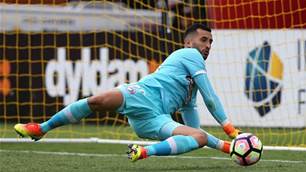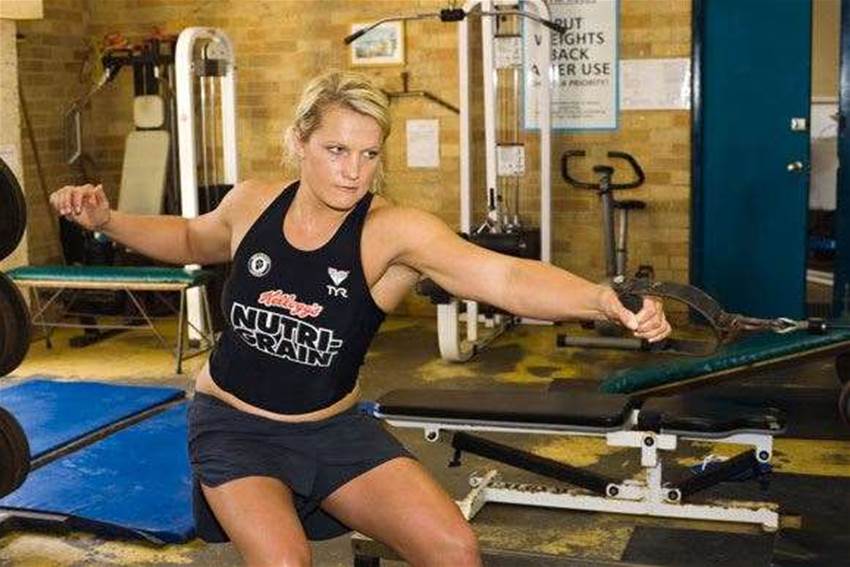There’s been a permanent “Flood Warning” for Manly and its surrounds for over two decades now, and the locals wouldn’t have it any other way. The cause? Naomi Flood.
There’s been a permanent “Flood Warning” for Manly and its surrounds for over two decades now, and the locals wouldn’t have it any other way. The cause? Naomi Flood.
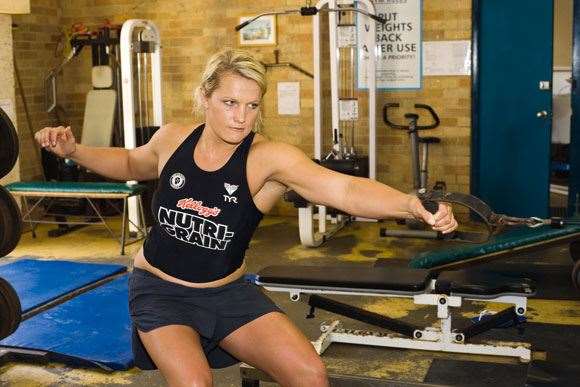 Naomi Flood’s gym sessions aren’t long, but they’re explosive ... and tough. Images: William Fogden
Naomi Flood’s gym sessions aren’t long, but they’re explosive ... and tough. Images: William FogdenShe’s 23, boasts a killer work ethic and last summer was crowned Kellogg’s Nutri-Grain Ironwoman series champion. It was the latest milestone in a long list which only dates back three years to her claiming the Australian Open Ironwoman championionship. Since then she’s added the NSW title to her resume, was named state captain in 2007 and in ’08 secured the World Ironwoman title.
All that’s pretty impressive, but she’s loved around Manly for a lot of other reasons, too. “She gives as much back to the local surf-lifesaving club as the club supports her,” one popular clubman whispered to us. “She’s the first to put her hand up if asked to do anything promotional, etc. If the nippers ask ‘Floody’ to talk to the kids, do a little skills lesson, she’ll be in it. Whatever’s asked of the girl, she does.”Here’s how Flood has been preparing for a revamped Kellogg’s Ironman series over recent months. It’s every man and woman for themselves this summer, which is just how Floody likes it.
NEW RULES
“Everyone’s for themselves now. There are no region-based teams any more, which is good. It’s going back to the grassroot days of when Ironman racing was in its prime. I think it’ll be a really good series. They’ve changed it a bit by running individual legs. You do a board race, then you have a quick rest, and people get knocked out. You do a ski race, people get knocked out … It makes it a bit more exciting for television and makes the racing tighter … if it could be any tighter.“I think the new format will suit me fine. Then again, you don’t know for sure until you get to the starting line. It all depends on who’s done what training, who wants it the most and who’s the most mentally prepared.”
TRAINING PLACES
“I train at Manly Beach every weekday afternoon and Saturdays for a few hours. Monday through Friday, usually from 5-7am, I also swim at the Warringah Aquatic Centre, where I swim between 5-7km, depending on the time of year. This morning, for example, was an aerobic set – I swam about 5km before doing a bit of kayaking. My swim load changes depending on what day it is, too, whether I’ve raced on the weekend or what’s coming up [sprints, long distance, heart rate sessions]. My swimming is always of varying intensity. It keeps me guessing.”
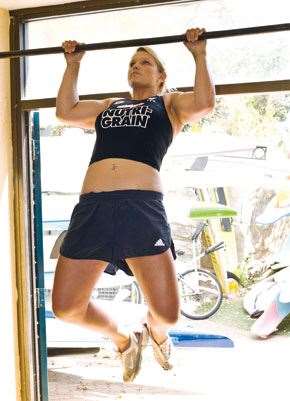 Image: William Fogden
Image: William FogdenIN THE GYM
“I try not to do too much gym because it’s harder to recover before the next session. Usually I’ll do gym Mondays, Wednesdays and Fridays. The sessions can vary between 20-45 minutes. Anything more than that and I’ll have nothing left in the tank. I won’t recover. I just do enough to hurt and enough to get a good benefit out of it.“In my new gym program, I’m doing a lot of dumbbell and bench press work. We superset it: 12 reps, then we go into a push-up and a vertical arm raise push-up-type exercise. We’ll go 12, five push-ups at each angle, then we’ll go two 8s, three 6s and a 4, or something similar to that. You’re going up in weight and down in reps. Then we’ll superset a chin-up set: I’ll do as many chins as I can – full lockout, and then lat pulldowns. These have to add up to 20, so if I do four chins, I have to do 16 lat pulldowns, if I do ten chins, I then have to do ten lat pulldowns. “For the legs I’m doing cleans, snatches … not big squats, but kind of heavyweight squats at the moment. I’ve squatted up to 110kg – for about six reps. It’s pretty full-on. I’ve only been doing gym for about 18 months. I’d never done it before. I really enjoy it. It’s one of those things where I feel I can see a lot of improvement quickly. We only recently started this program – by next week I’ll be buggered as all hell. My fibres will be torn something severe. There’s kind of a two-week adaptation phase I find that I go through. “I’ve been swimming since I was six and it can take me six-to-eight weeks to go half a second faster – and that’s swimming five-seven kilometres every day. Gym’s been really good for me. I’ve become a lot stronger and it’s changed my physique a bit, so I must be doing something right.”
THANKS, COACH
“My coach is Trent Herring. He takes me for every one of my personal training sessions which focus on the Ironwoman series. He takes me boxing, we do gym together … He doesn’t come to the pool in the mornings because I have another coach for swimming – Ben Davies. He corresponds with Trent and discusses what session I’ve done the night before; if I have a hard session on Tuesday night, Wednesday will be bit easier for me, like a recovery session. I don’t know how they work it out, but it seems to be working at the moment. Trent’s one of the Surf Club coaches. He and Sean Kenny coach the whole senior crew at Manly.“The support network I have is really good. The Manly Surf Life Saving Club supports me all the way. Everyone comes to watch me race when the events are on in Sydney. They all dress up in ‘Flood Warning’ gear and make signs. It’s really exciting.“My mum Karrin, dad Kevin and brother Simon have been really supportive; I couldn’t have done what I’ve done and got where I’ve got to without them. They come to all the races with me. In golf you have caddies – well, Dad’s like my caddie.”
WE’RE ALL INDIVIDUALS
“Even though it’s an individual sport, I also train with a big squad of guys and girls of varying ages. In my swim squad, for example, there’s 11-year-olds through to 45-year-olds. We’re from all over different parts of the northern beaches and the north shore of Sydney. We’re from different sports, too: there’s water polo players, pure swimmers, surf-lifesavers, triathletes … It makes it pretty interesting. The size of the group can vary between ten people to 40 people. It’s the same down the beach, depending
on what the weather’s like, what the surf’s doing, whether it’s holidays or not. You can get anywhere between five to 40 people out on the water.“It’s good for me because there’s always someone in the group to chase, someone to try to pace myself off, someone to try and peg back.”
TOTALLY BOARD
“I do a pure board session on Mondays. I might do a five-minute blast at 80 per cent, two minutes at 90 per cent twice through, and then some really short, sharp stuff off the beach. Sometimes I’ll do longer stuff like eight four-minuters, just building,building. My board work’s mainly intense, explosive work, but you need a big base for board paddling, swimming and ski paddling, so in the off-season I clock up a lot of kays, getting a lot of mileage into the arms and legs. As it comes back into racing season, I shorten it up a lot, trying to get a bit more explosive, getting those fast-twitch fibres working.”
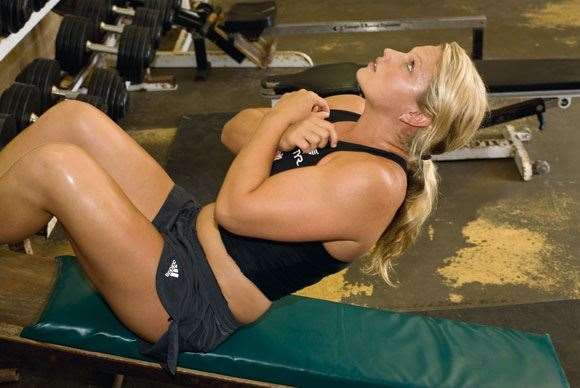 Core Work. Image: William Fogden
Core Work. Image: William FogdenON THE RUN
“In the Kellogg’s series races we’ll run anywhere between 80m-180m. Running’s my weakest leg; I’m a bit too big for it. I’m one of the bigger girls in the series. It’s a lot harder for me to come from swimming, get up, get the blood flowing in my legs, then speed around the course. Trent, when I’m coming out of the water from a swim, board or ski, sometimes makes me jump into a rope which has a big tyre attached to the back of it. I’ll put the rope around my belly and I’ll drag the tyre for a bit of resistance work. I kind of crack the shits a bit when he makes me do it, but it’s all beneficial. It’s the sort of work you need to do. It gets the blood moving from different parts of the body. You’re horizontal, to standing up, to running, to getting your legs to work – when your legs are still thinking of swimming. You have to get up and go and just be ready for it.”
SKI SESSIONS
“My surf ski sessions feature lot of skills and explosive stuff because I’m in the racing part of my regime. It’s important to get as much work done before the series as possible to get as much in the bank as you can and then just draw on that. From there it’s all about maintenance, keeping on your game and trying to stay healthy and injury-free. “I train with a lot of the ski paddlers and board paddlers, but they don’t do Ironman or Ironwoman racing – they basically just prepare for ski races. Their needs are different to mine: I have to back-up and work on my fitness and do cross training for all three disciplines. It’s pretty time-consuming.”
YOU ARE WHAT YOU EAT
“I’m pretty big on fruit and veg. I don’t intake a lot of pure carbohydrates. I’m not into eating too much cereal and bread or pastas – or typical carb loading – like most athletes. “I eat a fair bit of chicken, lean red meat and a lot of fish. I try and keep foods in my diet as fresh and natural as possible. I like almonds, the nut mixes. I’m not too big on diary. I just try and keep it simple. The only supplement/sports drink I’ll have is Juice Plus. It’s a pure vegetable and fruit extract. No one eats enough fruit and veg – especially athletes. We’re on that fine line of being super-fit or in bed sick. You need to keep on your game.“They say you are what you eat, and I totally agree with that. If I haven’t had a good meal, I’ll get headachy and start to feel tired and empty. Even if I’ve had a large meal, like a big bowl of pasta, I’ll feel lethargic. I’m not used to it. It wouldn’t sit well with me and I’d be at training, whinging.”
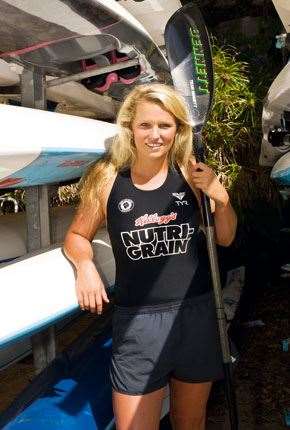 Kellogg's Nutri-Grain Ironwoman Series
Kellogg's Nutri-Grain Ironwoman SeriesImages: Wayne Fogden
ACTIVE REST
“Wednesday is my biggest day; I’ll usually come off a Tuesday night ski session and into swimming the next day. In the morning I’ll do gym and Wednesday night we’ll do races/Ironman changeovers. Sometimes I’ll box as well. So Thursday morning I’ll go to the pool and swim easy. I’ll go kayaking and just work on technique. Rest is really important. I need a lot of sleep. Most nights I’m off to bed before 9pm because I’m up at 4.30am to go swimming again. I’ll sneak a bit of a sleep in after swimming in the mornings before I go to work. Sunday’s a day of rest, so is Saturday afternoon if I’m not racing.“Massage is really important, just to keep on top of the lactic acid and keep the body well oiled and ready to go. It’s almost as effective as sleep for me. It recharges the batteries. Rest is always something beneficial. Hanging out at home in front of the TV is still good. After training I’ll have dinner and basically fall asleep on the lounge.”
ALL FIRED UP
“The week leading into a race I just try to think about the beach and visualise the whole environment. I know most of the beaches we race at, so I try to visualise the stands and all the hoo-haa that goes with the day – getting introduced to the crowd, etc. Whatever the order is, swim/ski/board, board/ski/swim, I just try and go through the race mentally and think about skills, how I’m feeling and basically just visualise the whole thing. It’s good to go through it all, just so you know what to expect.“I’m known as a bit of a larrikin, so on race days I kind of muck around a bit, crack a few jokes and try and have a good time and enjoy the experience. It’s very serious racing but you need to enjoy it. It’s your job but it’s also your passion. I enjoy rocking up to the beach, getting those butterflies, getting nervous and just getting ready to race.“I’ll go through the different spots on the beach of where the rips are with Trent, where the water’s moving, different breaks, sandbanks, how deep the water is, what the tide’s doing … ”
BANKING ON IT
“I work for St George bank as a bank teller part-time. I work roughly 21 hours a week. I’m there for four-five hours in between training in the middle of the day to cover lunch breaks at the branch I work at. The bank has been really good to me over the past few years. They’ve sponsored me and helped my development. It’s been good for me to be off the beach and out of the sun, to have something away from surf-lifesaving. My Ironwoman racing isn’t going to be there forever for me. They’re really understanding and are very lenient about me being an athlete and my training and racing. I spend a lot of time throughout the year overseas or away doing training camps and racing at different parts of the world and they’re really accommodating.”
– James Smith
Related Articles

Socceroo-in-waiting seals Championship deal

Fringe Socceroo swerves A-League to remain in Europe after Fulham exit
